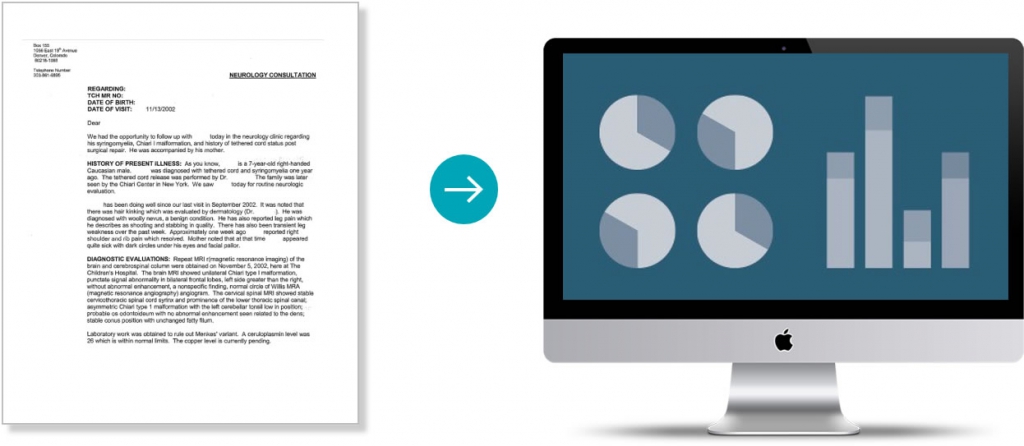iGuana is pleased to announce its partnership with LynxCare Clinical Informatics.
LynxCare Clinical Informatics is a Belgian medical IT and services company, founded and managed by a medical doctor and a pharmacist. LynxCare developed a unique data processing engine using Natural Language Processing and Artificial Intelligence to transform unstructured medical data into actionable insights for patients, doctors and hospitals.
By combining the power of the iGuana iDM Medical Records Scanning & Archiving Solution with the Lynx CareMonitor Engine, iGuana and LynxCare can help hospitals make use of massive amounts of clinical data, extract critical information out of them and utilise it to improve quality of patient care.
The iGuana – LynxCare Solution for Unstructured Medical Data
Hospitals process vast amounts of medical information on a daily basis. Since most of these data are unstructured, it is becoming increasingly more challenging for hospitals to analyse them in a consistent way and extract real-time information that may be critical to clinical research, patient treatment and care.
This is especially true for hospitals with a large backlog of paper medical files. As long as these files are on paper and stored away in a physical archive, the important medical data contained in them cannot be very easily aggregated and analysed; nor can they be integrated into the hospital’s essential IT systems, such as HIS or EHR (Electronic Health Record).
Central Archive of Digital Patient Data
The first step is to collect all patient related data from paper sources and archive them in a logical, structured, secure and legally compliant manner in a central digital database. With the iGuana iDM Medical Records Scanning & Archiving Solution, paper records are scanned, indexed, and undergo OCR (Optical Character Recognition). They are then automatically classified within a logical tree structure in iGuana iDM digital archiving software to enable easy file content search (similar to Google search), document retrieval and on-demand access by multiple authorised users.
The final result is the creation of structured EMRs (Electronic Medical Records). These EMRs can then be analysed by the LynxCare data processing engine and integrated, along with critical insights into data contained in them, into the hospital’s HIS, EHR, or other systems.
Real-time Analytics for Decisions that Matter
Once patient medical data are structured in a digital archive in the form of EMRs, the Lynx CareMonitor Engine mines OCR’d text and extracts critical concepts and content from patient consultation, hospitalisation, operation, treatment history, and other reports. These extracted concepts are summarised, categorised and presented in the form of real-time insights into clinical data and internal processes that can be used by hospitals and doctors to improve the quality of care experienced by patients.
LynxCare’s unique technology combines both human and artificial intelligence, making data processing and summarisation fast, secure and reliable. Data extracted by the CareMonitor are presented to physicians in SNOMED CT coding. SNOMED CT is the most comprehensive, multilingual clinical healthcare terminology resource in the world. It is owned by The International Health Terminology Standards Development Organisation (IHTSDO).

Added Value for Hospitals, Doctors and Patients
The combined iGuana – LynxCare solution allows hospitals to aggregate massive amounts of unstructured documents and big data in one central digital archive, structure this information, analyse it, validate it, integrate it into existing IT systems (such as HIS or EHR), and enable medical staff to make informed decisions about patient care.
Doctors know what clinical data they have, understand how these data are related, and can act on these data in real time. They can also validate these data and automatically transfer them into their current HIS / EHR via HL7, SumEHR and other interfaces.
More specifically, some of the key advantages for hospitals, doctors and patients include (but are by no means limited to):
About LynxCare Clinical Informatics
LynxCare Clinical Informatics is a medical IT company founded and directed by a doctor and a pharmacist. LynxCare transforms structured and unstructured medical data and PROMs (patient recorded outcomes) into actionable insights for patients, doctors and hospitals. A clear, reliable overview on the patient’s medical history provides insight for both patients and care providers, shortening the road to a correct diagnosis, treatment and recovery. LynxCare’s roots lie in the US, with Lynx Collaborative Care Network, Inc.


